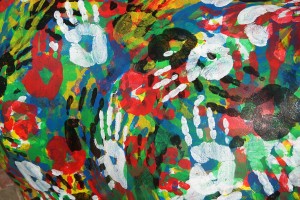
“Good faith does not prioritize relationship with God over and against relationships with one another. It reveals relationship with God in relationship with others.”
-Gabe Lyons and Dan Kinnaman in Good Faith (2016)
“They (White America) are in effect still trapped in a history that they do not understand; and until they understand it, they cannot be released from it. They have believed for many years and for innumerable reasons that black men are inferior to white men. Many of them, indeed, know better, but, as you will discover, people find it very difficult to act on what they know. To act is to be committed, and to be committed is to be in danger.”
-James Baldwin in The Fire Next Time (1962)
“What should abolitionists do with the Negro?’ I have had but one answer from the beginning. Do nothing with us! Your doing with us has already played the mischief with us. Do nothing with us! If the apples will not remain on the tree of their own strength, if they are worm-eaten at the core, if they are early ripe and disposed to fall, let them fall… And if the Negro cannot stand on his own legs, let him fall also. All I ask is, give him a chance to stand on his own legs!”
-Frederick Douglass (19th Century)
“Cry aloud; do not hold back; lift up your voice like a trumpet; declare to my people their transgression, to the house of Jacob their sins. Yet they seek me daily and delight to know my ways, as if they were a nation that did righteousness and did not forsake the judgment of their God; they ask of me righteous judgments; they delight to draw near to God. ‘Why have we fasted, and you see it not? Why have we humbled ourselves, and you take no knowledge of it?’ Behold, in the day of your fast you seek your own pleasure, and oppress all your workers. Behold, you fast only to quarrel and to fight and to hit with a wicked fist. Fasting like yours this day will not make your voice to be heard on high. Is such the fast that I choose, a day for a person to humble himself? Is it to bow down his head like a reed, and to spread sackcloth and ashes under him? Will you call this a fast, and a day acceptable to the Lord? “Is not this the fast that I choose: to loose the bonds of wickedness, to undo the straps of the yoke, to let the oppressed2 go free, and to break every yoke? Is it not to share your bread with the hungry and bring the homeless poor into your house; when you see the naked, to cover him, and not to hide yourself from your own flesh? Then shall your light break forth like the dawn, and your healing shall spring up speedily; your righteousness shall go before you; the glory of the Lord shall be your rear guard. Then you shall call, and the Lord will answer; you shall cry, and he will say, ‘Here I am.’ If you take away the yoke from your midst, the pointing of the finger, and speaking wickedness, if you pour yourself out for the hungry and satisfy the desire of the afflicted, then shall your light rise in the darkness and your gloom be as the noonday. And the Lord will guide you continually and satisfy your desire in scorched places and make your bones strong; and you shall be like a watered garden, like a spring of water, whose waters do not fail. And your ancient ruins shall be rebuilt; you shall raise up the foundations of many generations; you shall be called the repairer of the breach, the restorer of streets to dwell in.”
Isaiah 58 (ESV)
The events of the past week have deepened the severity of an existing wound. It is difficult to find another frame that makes sense of what we saw and continue to see. Now what we hear is a national conversation about race, justice, policing, and broken systemic realities. Many want the conversation to go away; it is uncomfortable at best and at worst deeply painful for too many. The black community is hurting and has for a long time lived in this pain. The law enforcement community is hurting and has for too long been asked to do way too much about the systemic realities they did not create. There are literally a dozen or more angles that this post could focus on, and it will most likely lead to a series of posts on race, reconciliation, justice, and the Gospel. The focus here is to shed light on systemic realities that have brought us to the current cultural moment and to demonstrate to my brothers and sisters in Christ that the Gospel compels us to see, attempt to understand, and then act with a transformational redemptive paradigm of social justice.
Too many pause at the idea of social justice and discard it as the radical ideology of those with political agendas. As a Gospel believer, I cannot imagine Christianity without the drumbeat of justice front and center in the mission of God. Christ came to save sinners, yes, and he came to create a just society that reflects the nature and character of God.
Our God is love, just, good, faithful, near, and so much more. We should aspire to be all that he has shared with us to be, and we should reach for the same in society. Isaiah 58 (above) is clear that justice for the oppressed, the afflicted, and the poor are at the heart of God’s desire for the world he has created. In fact, the lack of blessing that Israel faced and the failure of their fasting was linked to their lack of care for justice and loosing the bonds of affliction and oppression.
Oh, how much this has to say to us today!
Those who argue that we just need to repent and trust God and then our nation will be healed again, fail to realize that when the Gospel takes hold, God means for it to create something in us and through us. We are called to be a redeemed people working towards a redeemed, just society. “your kingdom come, your will be done on earth as it is in heaven,” is about so much more that personal salvation and the scriptures make that clear!
Let’s be clear about biblical social justice. Kevin DeYoung writes on the concept of social justice, and his thoughts have been helpful to me personally. The concept of social justice has two main schools of thought, constrained and unconstrained. Unconstrained social justice holds that society is unjust so long as there is not equality in income, wealth, and resources. Fairness is determined by all having equality in status and material. Most probably assume this idea of social justice. To be sure, this is the most controversial and it is, therefore, the view that is exploited in the media. The media has no vision for the biblical view and mandate for social justice, we do!
Constrained social justice is all about creating a just society. It recognizes that equal opportunity, equal access, and equal value are at the heart of a Kingdom society. Redistribution is not the redress that is needed but hearts and minds that see the surpassing equality in all humanity as image bearers, fellow heirs to the graces of this life, and equal in value and dignity before the Lord. When this happens, changed hearts and minds work to change the injustices in society. Believers, we have a responsibility to act and to do so with purpose and understanding, with the mandate of gospel justice blowing at our backs.
We do not live in a just society! Saying we are so much better isn’t helpful when so much more needs to be done.
When the rate of incarceration is almost twice that as the violent crime rate when 1 in 4 black men* will spend time incarcerated compared to 2 in 100 white men (although black people make up only 12.3 % of the population), equality of access, opportunity, and value do not exist. When black unemployment is twice that of the national measure and more than twice white unemployment, we do not have equality of access, opportunity and value. When black Americans are half as likely to attend college compared to white Americans, and three times more likely to attend poor schools lacking in resources, we do not have equality of access, opportunity, and value. When the numbers demonstrate that blacks are far more likely to experience physical encounters with the police than whites we lack equality of value for sure, and this exists because of a lack in access and opportunity, period!
I could write for days on the statistics that demonstrate extreme disparity and reveal systemic inequality and institutional racism. But, the point should be clear. I was once told to “look long enough for it to hurt.” I ask the same of my brothers and sisters in Christ. I especially ask this of my white evangelical brothers and sisters, that have surrendered the ground of social justice to progressive theology and politics. We cannot act until we understand there is a problem and believe we are called to act. There is a problem, and we are called to act! God’s glory seen through his people is at stake in our seeing and our action.
*This post is looking at the disparity of black minorities compared to the society and white population. The criticism that we should also consider other minorities is valid to an extent, but needed limits exist for this post. I will consider this overall picture in the future, but for now given the moment we are in, I believe this highlight is warranted.
**The Identify Network has a value to equip the church on issues of cultural transformation. This has largely existed in the area of sexuality and gender but it naturally includes racial unity and justice. We speak to the church for the marginalized because the Gospel compels us to.











